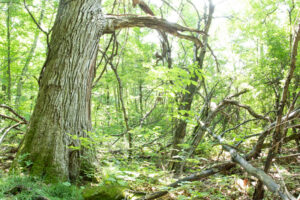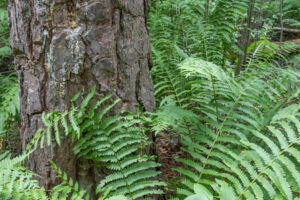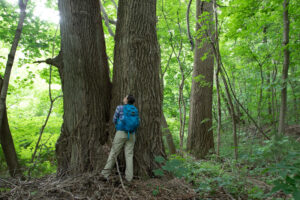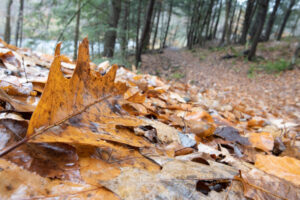Tree Identification & Natural History





Instructor: Jonathan Shapiro
June 22 - 23, 2024 | $285
Course size: 12 students
Financial support available (contact us)
L
earning about trees can be a powerful way to connect to your local landscape. They are big, charismatic, and always around us. Knowing who they are provides a baseline ecological understanding for the rest of our surroundings. Join Jonathan Shapiro of Fox Paw School for a dive into the natural history and ID of trees.
First, we’ll explore the ecological and natural history of trees in our area, looking at adaptations to climate, weather, and habitat, as well as focusing on how trees fit in to the life cycles of other organisms. We’ll then move on to ID using a pattern-based approach that we are hardwired to understand, talking about tree silhouettes, branching patterns, leaf shapes, bark, and more.
Participants will leave with the observational skills to learn not only trees, but the rest of the landscape as well.
Course Goals & Objectives
- Provide a basic overview of the biome-based natural history of our area.
- Introduce the diverse tree species of the North Woods.
- Learn how habitat, topography, and elevation affect tree species distribution.
- Discuss tree adaptations to northern latitudes.
- Introduce and practice critical observation skills.
- Cover basic field ID.
- Discuss ways to further skills at home.
About the Instructor
Jonathan Shapiro believes that a deep and accurate understanding of the more-than-human world is necessary for us to be healthy, both culturally and individually. The Fox Paw School is his small effort towards reconnecting himself and other humans with the rest of our wild kin. When he's not teaching, you'll find him poking around beaver wetlands, watching the clouds and listening to birds. He holds a Specialist certificate in Track & Sign and a level III certificate in Trailing from Tracker Certification North America.
Physical Requirements
Participants must be able to walk 2-3 miles over the course of each day, sometimes off trail over uneven and potentially muddy terrain. Participants should be comfortable outside in potentially hot, muggy, wet, and/or buggy conditions for long periods of time. Please reach out to us if you have any questions about mobility and/or other accessibility needs.
Recommended Reading
- Michael Wojtech, Bark: The only field guide of its kind—a great way to start honing your observation skills for bark patterns. Useful when there are no leaves out, if the leaves are too high to accurately see, or anytime, really.
- Trevor Evans, Forest Trees of Vermont: There is no one best field guide for trees—they all have their pros and cons, but this one is Vermont-specific, well-written, and durable.
- Bernd Heinrich, The Trees In My Forest: Engaging narrative look at the forest ecology of Northern New England, with lots of relevant tidbits for our area.
- John Pastor, What Should a Clever Moose Eat?: General natural history of the North Woods, with a wonderful focus on how trees intertwine with other members of the biotic community as part of an ecological baseline.
- E.C. Pielou, The World of Northern Evergreens: A fascinating, complete, and informative treatment circumboreal (ie around the globe, at far northern latitudes) evergreens. Highly relevant to our Boreal forests.
Meals
Participants should bring their own lunches and snacks.
Timing
Course begins 9 AM on Saturday at North Branch Nature Center and concludes by 5 pm. Course begins on Sunday at a time and location of the instructors' choosing and concludes by 5 PM on Sunday.
Academic Credit / Professional Development
This course may qualify for 1 graduate-level credit for an additional $200 course fee. All BioU courses may be accredited by Castleton University. Participants interested in receiving credit must contact us at one month in advance so we have time to arrange course accreditation.
It is the student’s responsibility to ensure that home institutions will accept the credit. Participants pursuing academic credit will be required to complete an additional assignment above and beyond the course hours, including literature review, reflective writing, or a field-based project.
This course qualifies for 20 hours of professional development hours and continuing education units. Certificates of completion are provided at the conclusion of the course.
Cancellation Policy
While we realize that unexpected circumstances arise that are out of our control, North Branch Nature Center cannot guarantee refunds for registrations cancelled within 30 days of the course. If a cancellation occurs within this window, NBNC will attempt to fill the space from our wait list and provide a full refund. If the course needs to be cancelled by NBNC, we will provide a full refund.

713 Elm Street
Montpelier, Vermont 05602
(802) 229-6206
Hours: Center Open Monday-Friday 9-4
Trails Open 24/7


